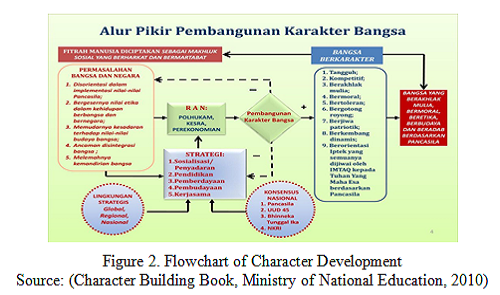
Education of Citizenship in Higher Education as A Fortress of Nation Characters in Facing Era Society 5.0
Abstract
This article is the result of thinking about the position of citizenship education in higher education as a bastion of the nation's character in facing the era of Society 5.0. The national education system Citizenship Education is an integrative part that is realized in the form of curriculum and learning in all lines and levels of education. Various functions and roles of citizenship education in the context of achieving national education goals are designed, and implemented as a form of manifestation. The nation's character is absolutely necessary in the middle of Era Society 5.0 which demands that society be able to control and balance the ability of artificial intelligence and social intelligence to solve all kinds of national problems. Society 5.0 provides an illustration that everything can be mobilized and linked through data, including as an effort to overcome social problems. In conclusion, students are equipped with skills needed in the era of society 5.0, including: leadership, digital literacy, communication, emotional intelligence, entrepreneurship, global citizenship. Citizenship education has the challenge of presenting critical, constructive and innovative thinking knowledge and skills by not leaving emotional, social and spiritual intelligence firmly entrenched as mandated in the Pancasila and the 1945 Constitution.
Keywords
Full Text:
PDFReferences
Afandi, R. (2016). Integrasi Pendidikan Karakter Dalam Pembelajaran IPS Di Sekolah Dasar. PEDAGOGIA, 1(1), 85–98.
Bandura, A. (1986). Social foundations of though and action: a social cognitive Theory. New York: Nj. Prentice-Hall.
Bucur, C. (2017). Knowledge Management: The importance of Learning Theory. Journal of Knowledge Management, (7).
DIKTI. (2006). Surat Keputusan Direktur Jenderal Pendidikan Tinggi Departemen Pendidikan Nasional Nomor 43/DIKTI/Kep/2006 tentang Rambu-Rambu pelaksanaan kelompok mata kuliah pengembangan kepribadian di Perguruan Tinggi.
DKITI. (2014). Pedoman Matakuliah Pendidikan Kewarganegaraan (Pkn) Sebagai Mata Kuliah Wajib Umum (MKWU). Jakarta: Direktorat Pendidikan Tinggi.
Falaq, Y. (2020). Pendidikan Kewarganegaraan (Merajut Moderasi Kebhinekaan Indonesia). Kudus: JF Press.
Faruqi, U. A. (2019). Survey Paper : Future Service In Industry 5.0. Jurnal Sistem Cerdas, 2(1), 67–79.
Ghufron, A. (2010). Integrasi Nilai-Nilai Karakter Bangsa Pada Kegiatan Pembelajaran. Cakrawala Pendidikan, 29(1), 13–24.
Gimin, S. (2019). ANALISIS KONSEPTUAL TEORETIK PENDIDIKAN KEWIRAUSAHAAN SEBAGAI SOLUSI DAMPAK ERA INDUSTRI 4.0 DI INDONESIA. Jurnal Pendidikan Ekonomi: Jurnal Ilmiah Ilmu Pendidikan, Ilmu Ekonomi, Dan Ilmu Sosial, 13(2), 1–14.
Government, C. O. (2018). Society 5.0. Japan.
Hayashi, H. S. (2017). International Standardization For Smarter Society In The Field Of Measurement, Control And Automation. 56th Annual Conference Of The Society Of Instrument And Control Eng.
Hermawan, J. W. (2019). Pendidikan kewarganegaraan sebagai wahana untuk meningkatkan kesadaran hidup yang lebih baik di era global. Jurnal Civics: Media Kajian Kewarganagearaan, 16(1), 29–38.
I, A. (2018). Proses Pembelajaran Digital Dalam Era Revolusi Industri 4.0. Jakarta: Direktur Jenderal Pembelajaran Dan Kemahasiswaan. Kemenristek Dikti.
Lestari, R. (2016). TRANSMISI NILAI PROSOSIAL PADA REMAJA JAWA. Jurnal Indigenous, 1(2), 33–44.
Mansyuri, A. (2012). Kewarganegaraan. Sidoarjo: Masmadia Buana Pustaka.
Nasional, K. P. (2010). Buku Induk Pembangunan Karakter. Jakarta: Badan Penelitian dan Pengembangan Pusat Kurikulum dan Perbukuan.
Oxfam. (2015). Education for global citizenship. A guide for school. Oxford: Oxfam GB, 1(5). Retrieved from https://doi.org/10.1002/9781444307214.ch6
Özdemir, V. (2018). Birth Of Industry 5.0: Making Sense Of Big Data With Artificial Intelligence,“The Internet Of Things” And Next-Generation Technology Policy. Omics: A Journal Of Integrative Biology, 22(1), 65–76.
Pahlevi, F. S. (2016). Revitalisasi Pancasila Dalam Penegakan Hukum yang Berkeadilan di Indonesia. Justicia Islamica, 13(2).
Rahmi. (2013). Kontribusi Matematika Dalam Pembentukan Karakter Siswa. Jurnal Ekotrans, 12(1).
S, W. (2018). Pendidikan Dalam Era Revolusi Industri 4.0 di Indonesia. Jakarta: PT. Gramedia.
Tilaar, H. A. (2012). Pengembangan Kreativitas dan Entrepreneurship dalam Pendidikan Nasional. Jakarta: Kompas.
Tirtarahardja, T. U. L. S. and U. (2005). Pengantar Pendidikan. Jakarta: PT. Rineka.
Undang-Undang No. 20 Tahun 2003 Tentang Sistem Pendidikan Nasional. (2003). Jakarta: MPR-RI.
Undang-Undang Nomor 12 Tahun 2012 Tentang Pendidikan Tinggi. (n.d.).
Yus Mochamad Cholily, Windy Tunas Putri, P. A. K. (2019). PEMBELAJARAN DI ERA REVOLUSI INDUSTRI 4.0. Seminar Nasional Penelitian Pendidikan Matematika (SNP2M) 2019 Universitas Muhammadiyah Tangerang, 1–6. Tangerang: FKIP Universitas Muhammadiyah Tangerang.
Yusnaini, Y. (2019). Era Revolusi Industri 4.0: Tantangan Dan Peluang Dalam Upaya Meningkatkan Literasi Pendidikan. Prosiding Seminar Nasional Program Pascasarjana Universitas Pgri Palembang. Palembang.
DOI: http://dx.doi.org/10.31258/jes.4.4.p.802-812
Refbacks
- There are currently no refbacks.
Copyright (c) 2020 Yusuf Falaq

This work is licensed under a Creative Commons Attribution 4.0 International License.
Publisher: FKIP Universitas Riau












